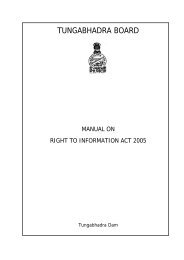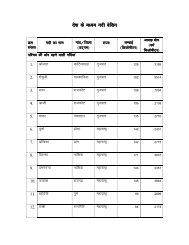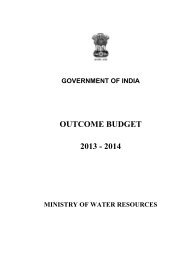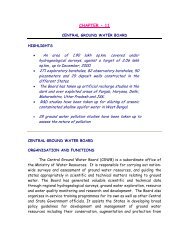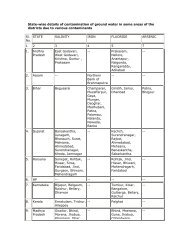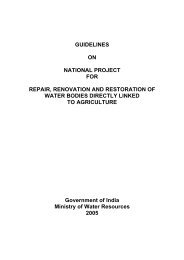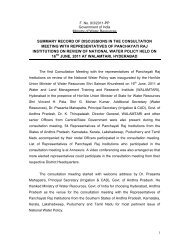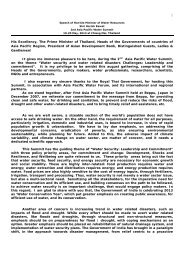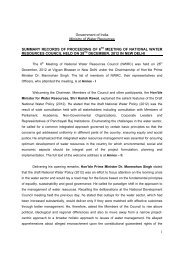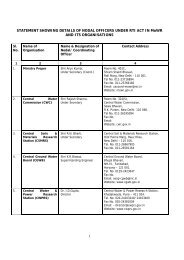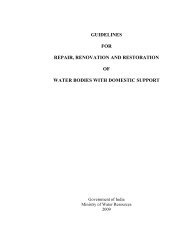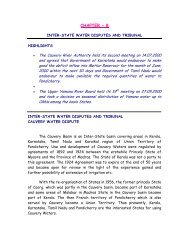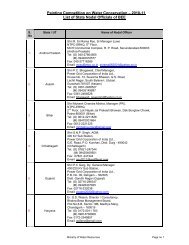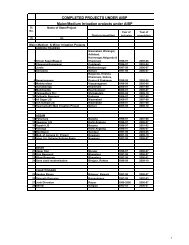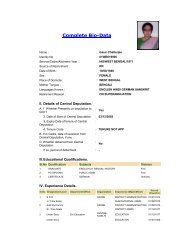Outcome Budget (2007-08) - Ministry of Water Resources
Outcome Budget (2007-08) - Ministry of Water Resources
Outcome Budget (2007-08) - Ministry of Water Resources
You also want an ePaper? Increase the reach of your titles
YUMPU automatically turns print PDFs into web optimized ePapers that Google loves.
NATIONAL WATER POLICY<br />
1.39 The revised National <strong>Water</strong> Policy was adopted by the National <strong>Water</strong><br />
<strong>Resources</strong> Council under the Chairmanship <strong>of</strong> the Prime Minister <strong>of</strong> India in its<br />
5 th meeting held on 1 st April, 2002.<br />
The salient features <strong>of</strong> the National <strong>Water</strong> Policy – 2002 are as under:-<br />
• <strong>Water</strong> is a precious national resource and its planning, development and<br />
management should be governed by national perspectives.<br />
• A well developed information system for water related data at national/state<br />
level should be established with a net-work <strong>of</strong> data banks and data bases<br />
integrating and strengthening the existing central and state level agencies.<br />
• <strong>Water</strong> resources development and management will have to be planned for<br />
a hydrological unit. Appropriate river basin organizations should be<br />
established for the planned development and management <strong>of</strong> the river<br />
basins.<br />
• <strong>Water</strong> should be made available to water short areas by transfer from other<br />
areas including transfer from one river basin to another, after taking into<br />
account the requirements <strong>of</strong> the areas/basins.<br />
• Planning <strong>of</strong> water resources development projects should, as far as<br />
possible, be for multi-purpose with an integrated and multi-disciplinary<br />
approach having regard to human and ecological aspects including those <strong>of</strong><br />
disadvantaged sections <strong>of</strong> the society.<br />
• In the allocation <strong>of</strong> water, first priority should be given for drinking water,<br />
followed by irrigation, hydro-power, ecology, agro-industries and nonagricultural<br />
industries, navigation and other uses, in that order.<br />
• The exploitation <strong>of</strong> groundwater should be regulated with reference to<br />
recharge possibilities and consideration <strong>of</strong> social equity. The detrimental<br />
environmental consequences <strong>of</strong> over-exploitation <strong>of</strong> ground water need to<br />
be effectively prevented.<br />
• Careful planning is necessary to ensure that construction and rehabilitation<br />
activities proceed simultaneously. A skeletal national policy on resettlement<br />
& rehabilitation needs to be formulated such that project affected persons<br />
share the benefits through proper rehabilitation.<br />
• Adequate emphasis needs to be given to the physical and financial<br />
sustainability <strong>of</strong> existing water resources facilities. There is need to ensure<br />
that the water charges for various uses should be fixed such as to cover at<br />
least the operation and maintenance charges initially and a part <strong>of</strong> the<br />
capital costs subsequently.<br />
• Management <strong>of</strong> the water resources for diverse uses should incorporate a<br />
participatory approach by involving users and other stakeholders alongwith<br />
various governmental agencies, in an effective and decisive manner.<br />
16



